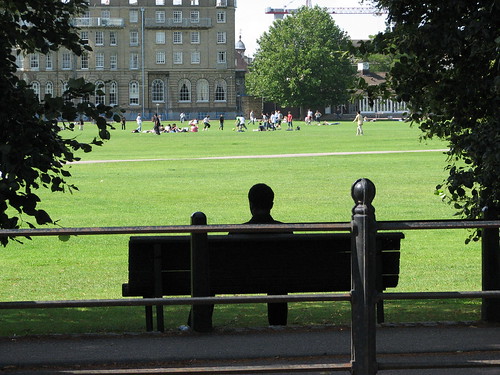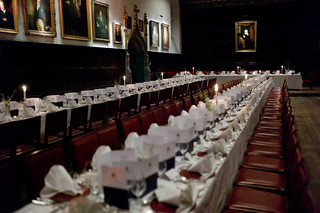Innovation, Responsibility, and Intellectual Tradition: Graduating from the University of Cambridge
Last weekend, I received my MA from the University of Cambridge, completing the first chapter of a very unlikely story that changed my life forever.

Graduations at Cambridge at are simple and intimate compared to American universities. There are no speeches, no parties, and no press coverage. In the early morning, we gather in our gowns (the same ones we wear to dinner), white bowties, and very Puritan-like bands. After standing and chatting in the courtyard, we assemble in rows of four and walk to the Senate House, the main assembly building of the university. Tourists with tele-photo lenses crouch and shoot, but we have long learned to ignore them.
Still in ranks, we enter the building and step forward. A representative from our college recommends us to the vice chancellor one-by-one. We kneel individually in front of the vice chancellor, who announces our degree before we walk out for another chat with friends on the Senate House lawn.
The morning ends with a leisurely lunch back in college. To outsiders, it must appear like a banquet. Without table service, the buffet lunch is appropriately relaxed and low-key, more modest than the full-service dinners which take place every evening in the dining hall.
For many students, this quiet event is their most public acknowledgement of an elite university education. Though university networks stay strong, British society attempts to keep the appearance of meritocracy. Most graduates keep their background quiet unless in the presence of other elites.
I spent graduation morning in the St John's College chapel. Its 19th century neo-gothic architecture can feel imposing, especially with a painting of Lady Margaret Beaufort gazing down piously. I was looking for the statues of the great friends and anti-slavery campaigners: Thomas Clarkson and William Wilberforce.
Clarkson was the researcher and statistician of the British antislavery movement. His 1786 information visualisation of slave ships is one of the most powerful political images of all time. On visits back to Cambridge, I often pause in the chapel to reflect and pray about the shape my life has taken, seeking clarity on how to live a life of principle, action, and devotion to God.
Studying at St John's College
Six years ago, the anonymous donor of the Davies-Jackson Scholarship funded me to study English literature at the University of Cambridge. The experience changed my life forever. Sitting in the chapel, I asked myself just what that change has been.
Six years ago, I had no idea what to expect from Cambridge. Home educated and from a rural, blue collar family of mixed nationality, there was no way I could know. Elizabethtown College had offered a feast of creative opportunity: music performance, creative writing, sculpture, academic research. But I lacked any vision for how apply those interests.
Keen to find a path of principle in dramatically new circumstances, I wrote an essay, a manifesto of sorts before moving to Cambridge:
...I have chosen the way of the polymath. I choose to travel a path in which no single interest gains solitary focus, but all skills focus toward a lifestyle centered in faith and channeled toward others.... I hope to have the focus, vision, and dedication necessary to go beyond any current job description to use all my talents for the benefit of others.
...I once thought that lines of code would be my greatest epitaph. I now see differently. When effort has finally emptied my limbs of all that is my portion of life, I hope to see a wake of positive effects rippling into the future: students who understand; people who find spiritual and social freedom; organizations that work well; and others inspired to true greatness.
The is the earnest prose of a young man reaching out with intense language to make sense of an unknown future. Already at this age, I had discovered early versions of the values which I hold most dear, in context of the lifestyle which makes me happiest.
If my experience before moving to the UK was a search for values amidst diverse creativity, then studies at the University of Cambridge were a time to learn focus and action. As a literature student, I learned to pinpoint the key questions of an issue and craft a focused argument in response. I also developed an initial style of writing and public speaking. As a leader in the Christian Union, I gave up personal pastimes to serve others and promote Christianity in the university. I started my first charity while at Cambridge.
And studies? The lectures and assignments in the English Faculty introduced me to enduring questions of importance. English literature also built my ability to unpack the values and politics of media in detail:
- can creativity help us escape the cultural constraints that colonise our mind?
- how should we portray human suffering?
- how do we talk about the conflicting obligations of choice in environments of misinformation?
- what role does the media play in the public spectacle of truth commissions?
- what is the psychology of censorship?
- what are the ethical and political responsibilities of writers?
- can media production fight cross-cultural misconceptions and invite empathy?
- can the subtexts of remixed media genuinely communicate within repressive societies?
I still cringe to remember the pointed criticism of some of my supervisors in response to my ignorant explorations of literature. And then I remember the amazing privilege of having two years to read and write about the poems, novels, plays, and politics of many cultures-- among a remarkable community of knowledgeable and articulate people.
That community, I now see, was uniquely wonderful. The college system prevents intellectual filter bubbles by placing people from all subjects into intimate groups and structuring life to include substantial social time. I miss the chance to sit at dinner alongside people of all subjects and discover their passions.
Life at St John's College also transformed my small aspirations into an active expectation of responsibility. Though my family is international, I grew up in the rural outskirts of a small town. At Cambridge, we were expected and prepared --not just encouraged-- to take active responsibility for our world.
By the end of the two years, I was completely burnt out, having started a charity, published computer science research, and written two dissertations while maintaining leadership positions in two student organisations. It was time for the next chapter, three years of building a more sustainable lifestyle in the UK. Those years included an amazing mix of tech startups, charity initiatives, research, creative projects, and my church community. Thanks to enlightened employers and supportive friends, I stayed as diverse as ever-- at a more sustainable pace.
The committee of the Davies-Jackson scholarship have remained meaningful and supportive figures in my life, years later.

The MIT Media Lab
I can't imagine a place more unlike St John's than the MIT Media Lab. Cambridge students write argumentative essays about well-known questions. Media Lab students apply imaginative creativity to explore the possibilites of questions not yet asked.
In many parts of Cambridge, the most valued intellectual creation is the argument. Students are measured by our ability to produce convincing answers to important questions. Imagination and creativity are mostly absent from the academic courses. Creativity is instead pursued through rich ecosystem of high quality university societies in the creative arts.
It is not possible to be innovative if you already know the questions, MIT Media Lab director Joi Ito likes to argue. As an anti-disciplinary kindergarten, Media Lab culture often encourages us to imagine and create visionary projects by making things and playing with them. While many of us do design technologies with very clear goals and an eye for impact, many of our projects have unclear academic relevance and limited theory.

The difference between Cambridge and the Media Lab is most clear in the formats that we use to develop our ideas. At Cambridge, the principal creative formats are well established: the essay, the lecture, and the book. At the Center for Civic Media, we participate in an ecosystem of open research: real-time collaboration with broad networks over Twitter, blogs, livestream videos, data visualisations, videochat, and email threads.
I sometimes miss the security and sense of mastery which I experienced at Cambridge. Every week, I wrote concise, argumentative essays on established literary topics, based on extensive, uninterrupted research. Every week, that essay was followed up with an hour of personal discussion with a faculty member. Amazing.
At the Center for Civic Media, research is a roughdraft-and-tumble activity, a fragmented, public, networked conversation that converges toward understanding. Consider, for example, the story of my work on media representation. My interest started with a Guardian Datablog post about women in UK media. When I retweeted it, Knight president Alberto Ibarguen tweeted back to express interest. I emailed the civic email list to ask for ideas on detecting gender bias in the media. Ethan showed me Cameron Marlow's blog post about Facebook diversity. Together with David LaRochelle at Harvard, I built an afternoon prototype to see how well we could detect gender in blogs and mainstream media. It worked!
We upgraded the project to an independent study, and I spent a semester learning the issues and building software to measure gender over 2 decades of the New York Times. I soon found myself having coffee with Joseph Reagle, who has carried out large-scale research on gender representation in Wikipedia and Britannica. I have enjoyed fascinating design sessions with Irene Ros, maker of beautiful visualisations of journalists' publishing behaviours. After giving an Ignite talk about the project, I received offers from journalists and newsrooms to collaborate. My work on media representation has also led to conversations and datavisualisations with the Global Voices community.
This idea which started as a retweet is now my MS thesis and will have more than half a dozen collaborators by the time it concludes. As a startup guy, I love this. Open, networked research, when supported by a team who constantly route ideas and contacts, is an exciting way to develop ideas and create technology.
Leaving Cambridge Behind
It is tempting to believe that I abandoned intellectual tradition for innovation when I left Cambridge UK last July. I seem to have left behind the slow hunch of scholarly progress to explore the world through conversation, creativity, and action.
Was Cambridge a MacGuffin? As I reflect on the end of a life-changing chapter of my life, I see a more consistent story. My prose style has changed since I wrote that manifesto « in my early twenties. But my values, which have refined over the years, are surprisingly similar.
Seven years ago, I aspired to a vague notion of creative diversity in support of social good. My education at the University of Cambridge refined that definition and set the scene for the first act. Now at the MIT Media Lab and Center for Civic Media, the characters are assembling for Act Two. I can't wait.
About the Davies-Jackson ScholarshipEvery year, the Davies-Jackson scholarship provides generous funding of a Cambridge degree for two American university graduates who come from backgrounds of limited means. The donor's story was very similar, and he has now funded 20 years of students (Read here to learn how to apply).

